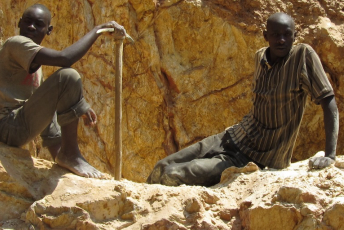Africa’s artisanal and small-scale gold mining sector has development potential. At its peak in 2017 this sector in Niger employed directly and indirectly as many as 600 000 people and created opportunities for local infrastructural development. But it is undermined by criminals profiteering from it at the expense of vulnerable populations, ENACT research shows.
Criminal collaboration between some ‘Nigerians in high positions of authority’ and Chinese corporations in the illegal mining of gold drive rural banditry and violent local conflicts in some parts of Nigeria. This includes the North West, North Central and to some extent South West regions.
An estimated 80% of mining in the North West region is carried out illegally and on an artisanal basis by local populations. This mining of large untapped deposits of minerals in the area, especially gold, because of its strategic importance and economic value, is at the root of violent local conflict.
The government’s ban of artisanal gold mining in Zamfara State and across the region and the deployment of the military to enforce the ban since April 2019 have yielded little result. Illegal mining and its associated conflicts continue regardless.
The conflict has been on the increase since 2014, spreading across Kaduna, Katsina, Kebbi, Plateau and Zamfara states. Over 5 000 people have been killed in Zamfara State in the past five years. This year alone, soldiers killed 13 bandits in Zamfara and Kebbi states during a clash on 22 February, bandits killed four soldiers in Zamfara State on 22 April, and police arrested two Chinese nationals for illegal mining in Zamfara on 27 April.
Illegal mining leads to violent local conflicts in two ways in the North West. First, the sponsors (funders) of illegal mining fight over control of the mining fields – this leads to violent conflicts. Dr Chris Kwaja, a senior researcher with the Centre for Peace and Security Studies, MAUTECH, Yola, tells ENACT that because the sponsors of illegal mining enjoy the support and protection of some state governments, they act as if they’re above the law.
Even when the governors of Katsina, Niger and Zamfara states led negotiations with the sponsors of illegal mining, this was under conditions determined by the sponsors. This shows the level of political connectedness and state protection they enjoy.
Second, those who sponsor illegal mining also fund rural banditry and cattle rustling in mining communities in order to cause violent conflicts among local cattle breeders and rearers. Locals from Zamfara State told ENACT, on condition of anonymity, that such conflicts lead to the displacement of local populations and create opportunities for illegal miners to operate. Many media reports blame the conflicts in the region on rural banditry, without addressing its links to illegal mining.
The rise in illegal mining which leads to violent local conflicts in the region highlights numerous fundamental social, institutional and structural problems in Nigeria’s governance system. First, it reveals the prevailing socio-economic problems in the region, especially the inadequate responses to poverty and poor service delivery by the state. The youth in particular have limited income-generating opportunities, and this is where the sponsors of illegal mining recruit their labour force.
Second, foreign corporations’ involvement in illegal mining depicts ‘the weakness and failure of regulatory oversight and gross inadequacies in the enforcement of regulatory compliance by respective governmental agencies’, says Yunusa Ya’u, executive director of the Centre for Information Technology and Development in Kano.
Illegal miners often front for politically connected individuals who collaborate with foreign nationals and corporations to sell gold and routinely smuggle it to Dubai through neighbouring Niger and Togo.
Some political ‘godfathers’ put pressure on the government to free Chinese nationals arrested for illegal mining in Zamfara State. This lends credence to the existence of a powerful network of organised criminals involving local populations and foreign nationals in Nigeria’s mining and extractive sector.
Third, the situation highlights inherent contradictions in the legal and regulatory frameworks that place ownership and control of all mineral resources in the federal government rather than the state governments, who are custodians of all land.
Section 1(1) of the Nigerian Minerals and Mining Act, 2007 empowers the federal government to exercise ownership and absolute control over all mineral resources in the country, including the mining process. What’s happening in the North West and across other regions of the country including the Niger Delta is the deliberate refusal of state governments to exercise security control over mineral resources because they consider them federal resources.
The situation clearly shows the deep-rooted structural crisis that characterises the lopsided nature of Nigeria’s fiscal federal system in favour of the central government. To address the challenge, Nigeria’s National Assembly should amend the mining act to place ownership and control of mineral resources on state governments rather than on the federal government.
In addition to rigorously enforcing its laws, Nigeria needs to deal, through diplomatic channels, with the involvement of foreign nationals and corporations in organised crime in the country. Most fundamentally, the government will need to address the problems of poor service delivery, especially in the area of poverty eradication among vulnerable members of the public.
Maurice Ogbonnaya, Senior Research Consultant, ISS Pretoria







